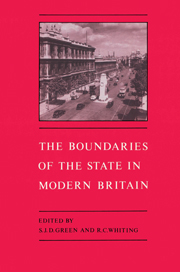Book contents
- Frontmatter
- Contents
- List of figures
- List of tables
- List of contributors
- Acknowledgements
- 1 Introduction: the shifting boundaries of the state in modern Britain
- Part I The state and political theory
- Part II The economy
- 6 The size and scope of the public sector
- 7 The boundaries of taxation
- 8 Economic knowledge and the state in modern Britain
- Part III Welfare and social policy
- Part IV Conflict and order
- Part V Religion and morality
- Index
8 - Economic knowledge and the state in modern Britain
Published online by Cambridge University Press: 18 March 2010
- Frontmatter
- Contents
- List of figures
- List of tables
- List of contributors
- Acknowledgements
- 1 Introduction: the shifting boundaries of the state in modern Britain
- Part I The state and political theory
- Part II The economy
- 6 The size and scope of the public sector
- 7 The boundaries of taxation
- 8 Economic knowledge and the state in modern Britain
- Part III Welfare and social policy
- Part IV Conflict and order
- Part V Religion and morality
- Index
Summary
A common theme connecting a number of chapters in this book is the idea that the extension of the boundaries of the state has created a market for experts. The experts with whom this chapter is concerned are people who claim to have economic knowledge. In it I argue that economic knowledge takes a number of forms and that professional economists do not have a monopoly of economic knowledge. Financiers, businessmen, trade unionists and financial journalists also have claims to be economic experts in that they may be able to predict how markets will behave, or advise on how scarce resources may best be distributed. I also suggest that the relationship between the state and economic experts is by no means one-way: the nature of the state's demand for economic knowledge has helped to shape economic knowledge, both the scope of data that are compiled and the aspects of economic theory that attract most attention from economists.
One problem in any such discussion is that there is no generally accepted definition of the term ‘economist’. Economics, unlike law or medicine, is a profession without controls on entry or formal means of maintaining standards. There is no standardisation of academic qualifications and indeed most British economists before 1914 had not taken a university degree in the subject.
- Type
- Chapter
- Information
- The Boundaries of the State in Modern Britain , pp. 170 - 188Publisher: Cambridge University PressPrint publication year: 1996



